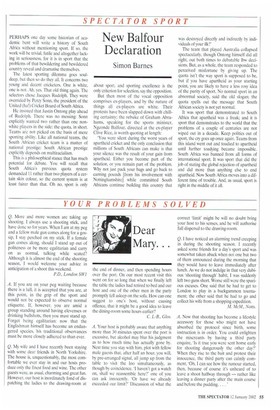New Balfour Declaration
Simon Barnes
PERHAPS one day some historian of academic bent will write a history of South Africa without mentioning sport. If so, the work will be trivial. futile and altogether lacking in seriousness, for it is in sport that the problems of that bewildering and bewildered country reveal and dramatise themselves.
The latest sporting dilemma goes souldeep, but then so do they all. It concerns two young and decent cricketers. One is white, one is not. Ah. yes. That old thing again. The selectors chose Jacques Rudolph. They were overruled by Percy Sonn, the president of the United (ha!) Cricket Board of South Africa.
He insisted that Justin Ontong play ahead of Rudolph. There was no messing: Sonn explicitly wanted two rather than one nonwhite players in the side: the quota, in short. Teams are not picked on the basis of mere sporting ability. Like all national teams, the South African cricket team is a matter of national prestige: South African prestige explicitly depends on multiracialism.
This is a philosophical stance that has much potential for debate. You will recall that South Africa's previous quota system demanded 11 rather than two players of a certain skin colour, so the current system is at least fairer than that. Oh no, sport is only about sport. and sporting excellence is the only criterion for selection, say the opposition.
But then most of the vocal opposition comprises ex-players, and by the nature of things all ex-players are white. Their protests have been slapped down with chilling certainty; the rebuke of Graham Abrahams, speaking for the sports minister, Ngconde Balfour, directed at the ex-player Clive Rice, is worth quoting at length: 'You were silent during the worst years of apartheid cricket and the only conclusion that millions of South Africans can make is that your silence was the result of your gain from apartheid. Either you become part of the solution, or you remain part of the problem. Why not just pack your bags and go back to earning pounds [from his involvement with Nottinghamshire] while committed South Africans continue building this country that was destroyed directly and indirectly by individuals of your ilk?'
The team that played Australia collapsed spectacularly, though Ontong himself did all right, out both times to debatable lbw decisions. But, as a whole, the team responded to perceived misfortune by giving up. The quota isn't the way sport is supposed to be, but if you have apartheid as your starting point, you are likely to have a less rosy idea of the purity of sport. No normal sport in an abnormal society, said the old slogan; the quota spells out the message that South African society is not yet normal.
It was sport that demonstrated to South Africa that apartheid was a freak; and it is sport that demonstrates to the world that the problems of a couple of centuries are not wiped out in a decade. Keep politics out of sport, the cry goes up once again. Teams from this island went out and toadied to apartheid until further toadying became impossible. South Africa was banned from all forms of international sport. It was sport that did the job of stating the global rejection of apartheid and did more than anything else to end apartheid. Now South Africa moves into a different time of trouble. And, as usual, sport is right in the middle of it all.


























































 Previous page
Previous page